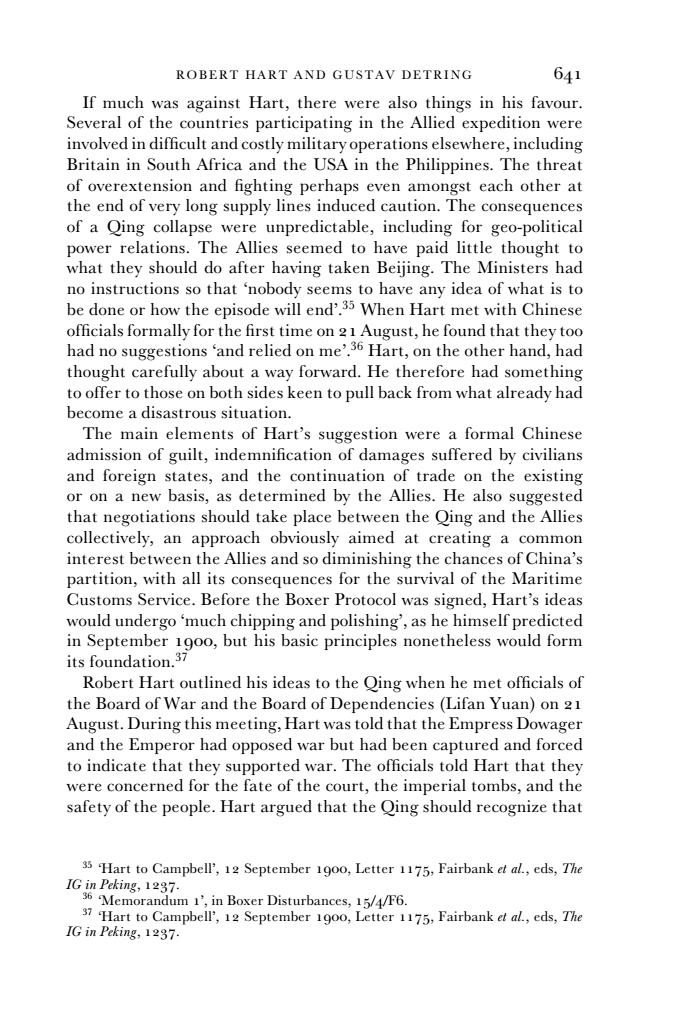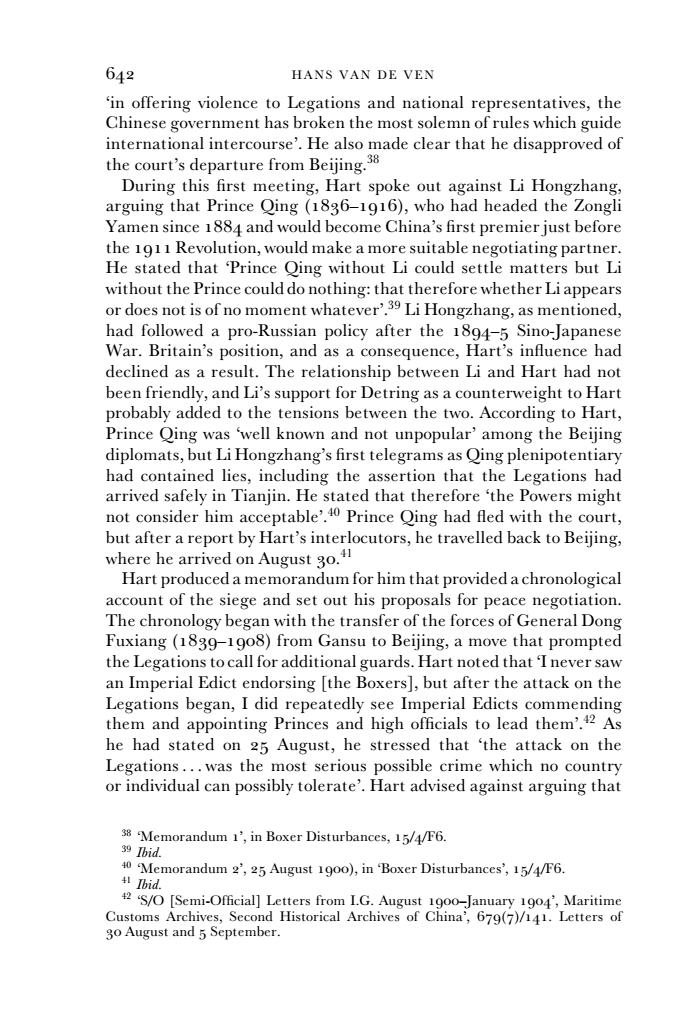
ROBERT HART AND GUSTAV DETRING 641 If much was against Hart,there were also things in his favour. Several of the countries participating in the Allied expedition were involved in difficult and costly military operations elsewhere,including Britain in South Africa and the USA in the Philippines.The threat of overextension and fighting perhaps even amongst each other at the end of very long supply lines induced caution.The consequences of a Qing collapse were unpredictable,including for geo-political power relations.The Allies seemed to have paid little thought to what they should do after having taken Beijing.The Ministers had no instructions so that 'nobody seems to have any idea of what is to be done or how the episode will end'.35 When Hart met with Chinese officials formally for the first time on 21 August,he found that they too had no suggestions 'and relied on me'.36 Hart,on the other hand,had thought carefully about a way forward.He therefore had something to offer to those on both sides keen to pull back from what already had become a disastrous situation. The main elements of Hart's suggestion were a formal Chinese admission of guilt,indemnification of damages suffered by civilians and foreign states,and the continuation of trade on the existing or on a new basis,as determined by the Allies.He also suggested that negotiations should take place between the Qing and the Allies collectively,an approach obviously aimed at creating a common interest between the Allies and so diminishing the chances of China's partition,with all its consequences for the survival of the Maritime Customs Service.Before the Boxer Protocol was signed,Hart's ideas would undergo 'much chipping and polishing',as he himself predicted in September 19oo,but his basic principles nonetheless would form its foundation.37 Robert Hart outlined his ideas to the Qing when he met officials of the Board of War and the Board of Dependencies (Lifan Yuan)on 21 August.During this meeting,Hart was told that the Empress Dowager and the Emperor had opposed war but had been captured and forced to indicate that they supported war.The officials told Hart that they were concerned for the fate of the court,the imperial tombs,and the safety of the people.Hart argued that the Qing should recognize that 35 Hart to Campbell,12 September 1goo,Letter 1175,Fairbank et al.,eds,The IG in Peking,1237. 36 Memorandum 1',in Boxer Disturbances,15/4/F6. 37Hart to Campbell',1 September 1g00,Letter 1175,Fairbank et al,eds,The IG in Peking,1237
ROBERT HART AND GUSTAV DETRING 641 If much was against Hart, there were also things in his favour. Several of the countries participating in the Allied expedition were involved in difficult and costly military operations elsewhere, including Britain in South Africa and the USA in the Philippines. The threat of overextension and fighting perhaps even amongst each other at the end of very long supply lines induced caution. The consequences of a Qing collapse were unpredictable, including for geo-political power relations. The Allies seemed to have paid little thought to what they should do after having taken Beijing. The Ministers had no instructions so that ‘nobody seems to have any idea of what is to be done or how the episode will end’.35 When Hart met with Chinese officials formally for the first time on 21 August, he found that they too had no suggestions ‘and relied on me’.36 Hart, on the other hand, had thought carefully about a way forward. He therefore had something to offer to those on both sides keen to pull back from what already had become a disastrous situation. The main elements of Hart’s suggestion were a formal Chinese admission of guilt, indemnification of damages suffered by civilians and foreign states, and the continuation of trade on the existing or on a new basis, as determined by the Allies. He also suggested that negotiations should take place between the Qing and the Allies collectively, an approach obviously aimed at creating a common interest between the Allies and so diminishing the chances of China’s partition, with all its consequences for the survival of the Maritime Customs Service. Before the Boxer Protocol was signed, Hart’s ideas would undergo ‘much chipping and polishing’, as he himself predicted in September 1900, but his basic principles nonetheless would form its foundation.37 Robert Hart outlined his ideas to the Qing when he met officials of the Board of War and the Board of Dependencies (Lifan Yuan) on 21 August. During this meeting, Hart was told that the Empress Dowager and the Emperor had opposed war but had been captured and forced to indicate that they supported war. The officials told Hart that they were concerned for the fate of the court, the imperial tombs, and the safety of the people. Hart argued that the Qing should recognize that 35 ‘Hart to Campbell’, 12 September 1900, Letter 1175, Fairbank et al., eds, The IG in Peking, 1237. 36 ‘Memorandum 1’, in Boxer Disturbances, 15/4/F6. 37 ‘Hart to Campbell’, 12 September 1900, Letter 1175, Fairbank et al., eds, The IG in Peking, 1237

642 HANS VAN DE VEN in offering violence to Legations and national representatives,the Chinese government has broken the most solemn of rules which guide international intercourse'.He also made clear that he disapproved of the court's departure from Beijing.38 During this first meeting,Hart spoke out against Li Hongzhang, arguing that Prince Qing (1836-1916),who had headed the Zongli Yamen since 1884 and would become China's first premier just before the 1911 Revolution,would make a more suitable negotiating partner. He stated that Prince Qing without Li could settle matters but Li without the Prince could do nothing:that therefore whether Li appears or does not is of no moment whatever'.39 Li Hongzhang,as mentioned, had followed a pro-Russian policy after the 1894-5 Sino-Japanese War.Britain's position,and as a consequence,Hart's influence had declined as a result.The relationship between Li and Hart had not been friendly,and Li's support for Detring as a counterweight to Hart probably added to the tensions between the two.According to Hart, Prince Qing was well known and not unpopular'among the Beijing diplomats,but Li Hongzhang's first telegrams as Qing plenipotentiary had contained lies,including the assertion that the Legations had arrived safely in Tianjin.He stated that therefore the Powers might not consider him acceptable'.40 Prince Qing had fled with the court, but after a report by Hart's interlocutors,he travelled back to Beijing, where he arrived on August 30.41 Hart produced a memorandum for him that provided a chronological account of the siege and set out his proposals for peace negotiation. The chronology began with the transfer of the forces of General Dong Fuxiang(1839-1908)from Gansu to Beijing,a move that prompted the Legations to call for additional guards.Hart noted that I never saw an Imperial Edict endorsing [the Boxers],but after the attack on the Legations began,I did repeatedly see Imperial Edicts commending them and appointing Princes and high officials to lead them'.42 As he had stated on 25 August,he stressed that 'the attack on the Legations...was the most serious possible crime which no country or individual can possibly tolerate'.Hart advised against arguing that 38 Memorandum 1',in Boxer Disturbances,15/4/F6 39 Ibid. 40 Memorandum 2',25 August 1goo),in 'Boxer Disturbances',15/4/F6. 4Ibid. 2S/O [Semi-Official]Letters from IG.August 1go0-January 1904,Maritime Customs Archives,Second Historical Archives of China',679(7)/141.Letters of 30 August and 5 September
642 HANS VAN DE VEN ‘in offering violence to Legations and national representatives, the Chinese government has broken the most solemn of rules which guide international intercourse’. He also made clear that he disapproved of the court’s departure from Beijing.38 During this first meeting, Hart spoke out against Li Hongzhang, arguing that Prince Qing (1836–1916), who had headed the Zongli Yamen since 1884 and would become China’s first premier just before the 1911 Revolution, would make a more suitable negotiating partner. He stated that ‘Prince Qing without Li could settle matters but Li without the Prince could do nothing: that therefore whether Li appears or does not is of no moment whatever’.39 Li Hongzhang, as mentioned, had followed a pro-Russian policy after the 1894–5 Sino-Japanese War. Britain’s position, and as a consequence, Hart’s influence had declined as a result. The relationship between Li and Hart had not been friendly, and Li’s support for Detring as a counterweight to Hart probably added to the tensions between the two. According to Hart, Prince Qing was ‘well known and not unpopular’ among the Beijing diplomats, but Li Hongzhang’s first telegrams as Qing plenipotentiary had contained lies, including the assertion that the Legations had arrived safely in Tianjin. He stated that therefore ‘the Powers might not consider him acceptable’.40 Prince Qing had fled with the court, but after a report by Hart’s interlocutors, he travelled back to Beijing, where he arrived on August 30. 41 Hart produced a memorandum for him that provided a chronological account of the siege and set out his proposals for peace negotiation. The chronology began with the transfer of the forces of General Dong Fuxiang (1839–1908) from Gansu to Beijing, a move that prompted the Legations to call for additional guards. Hart noted that ‘I never saw an Imperial Edict endorsing [the Boxers], but after the attack on the Legations began, I did repeatedly see Imperial Edicts commending them and appointing Princes and high officials to lead them’.42 As he had stated on 25 August, he stressed that ‘the attack on the Legations...was the most serious possible crime which no country or individual can possibly tolerate’. Hart advised against arguing that 38 ‘Memorandum 1’, in Boxer Disturbances, 15/4/F6. 39 Ibid. 40 ‘Memorandum 2’, 25 August 1900), in ‘Boxer Disturbances’, 15/4/F6. 41 Ibid. 42 ‘S/O [Semi-Official] Letters from I.G. August 1900–January 1904’, Maritime Customs Archives, Second Historical Archives of China’, 679(7)/141. Letters of 30 August and 5 September